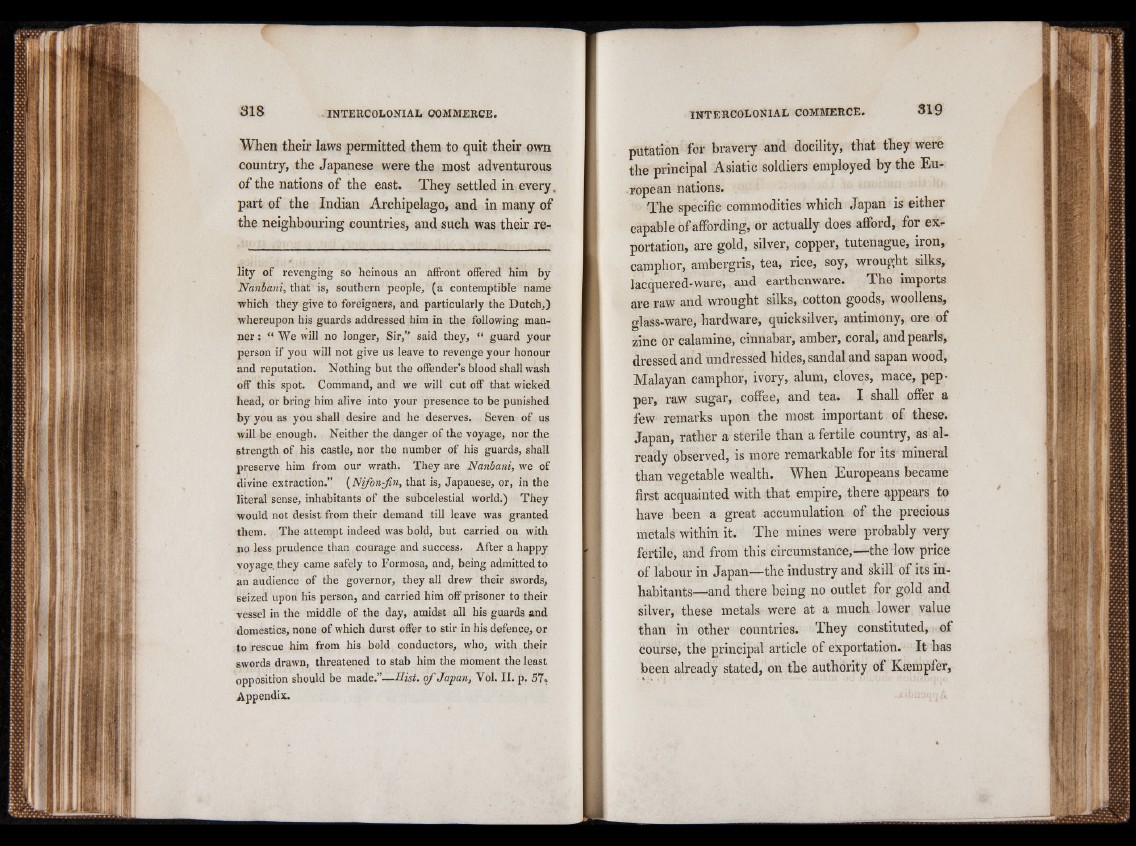
When their laws permitted them to quit their own
country, the Japanese were the most adventurous
of the nations of the east. They settled in every,
part of the Indian Archipelago, and in many of
the neighbouring countries, and such was their relity
of revenging so heinous an affront offered him by
Nanbani, that is, southern people, (a contemptible name
which they give to foreigners, and particularly the Dutch,)
whereupon his guards addressed him in the following manner
: “ We will no longer, Sir," said they, “ guard your
person if you will not give us leave to revenge your honour
and reputation. Nothing but the offender’s blood shall wash
off this spot. Command, and we will cut off that wicked
head, or bring him alive into your presence to be punished
by you as you shall desire and he deserves. Seven of us
will be enough. Neither the danger of the voyage, nor the
strength of his castle, nor the number of his guards, shall
preserve him from our wrath; They are Ndnbani, we of
divine extraction.” (Nifon-Jin, that is, Japanese, or, in the
literal sense, inhabitants of the subcelestial world.) They
would not desist, from their demand till leave was granted
them. The attempt indeed was bold, but carried on with
no less prudence than courage and success. After a happy
voyage, they came safely to Formosa, and, being admitted to
an audience of the governor, they all drew their swords,
seized upon his person, and carried him off prisoner to their
vessel in the middle of the day, amidst all his guards and
domestics, none of which durst offer to stir in his defence, or
to rescue him from his bold conductors, who, with their
swords drawn, threatened to stab him the moment the least
opposition should be made.”—Hist, o f Japan, Vol. II. p. 57.
Appendix.
putation for bravery and docility, that they were
the principal Asiatic soldiers employed by the European
nations.
The specific commodities which Japan is either
capable of affording, or actually does afford, for exportation,
are gold, silver, copper, tutenague, iron,
camphor, ambergris, tea, rice, soy, wrought silks,
lacquered-ware, and earthenware. The imports
are raw and wrought silks, cotton goods, woollens,
glass-ware, hardware, quicksilver, antimony, ore of
zinc or calamine, cinnabar, amber, coral, and pearls,
dressed and undressed hides, sandal and sapan wood,
Malayan camphor, ivory, alum, cloves, mace, pepper,
raw sugar, coffee, and tea. I shall offer a
few remarks upon the most important of these.
Japan, rather a sterile than a fertile country, as already
observed, is more remarkable for its mineral
than vegetable wealth. When Europeans became
first acquainted with that empire, there appears to
have been a great accumulation of the precious
metals within it. The mines were probably very
fertile, and from this circumstance,—the low price
of labour in Japan—the industry and skill of its inhabitants—
and there being no outlet for gold and
silver, these metals were at a much lower value
than in other countries. They constituted, of
course, the principal article of exportation. It has
been already stated, on the authority of Kæmpfer,